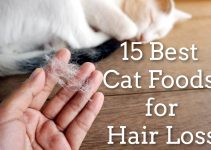Cats are carnivores by nature. Therefore, meat is an essential part of their diet. However, there are several diets and different ingredients that cats are allowed to eat, some of them are raw food, while others are cooked, some are dry cat food, while others are wet cat food. One of the foods that many cats enjoy eating is salami. However, there were different opinions about salami for cats.
Some cat parents consider salami raw food diet for their cats while others do not. Some of them say that it has benefits, and it adds nutrient values to the cat’s diet, while others say it should only be given to the cat as a treat. There are also cat parents who advise against feeding your cat salami. All of these different opinions leave us with the following questions: is salami good for your cat? Does salami add any nutritious values to your cat’s diet? Does salami have negative consequences on your cat’s health? Moreover, can cats eat salami?
NOTE: We want to inform our blog readers that before we publish any article the team “Proudcatowners” Do deep research based on experience and knowledge about cat’s and everything related to them, to guarantees reliable and precise information, satisfy the readers is our first priority
Can cats eat salami?
Since cats get all the healthy nutrients they need from meat, beef, chicken, and fish have always considered as a safe menu for your cat’s diet. However, many pet owners argue about salami and if their cats can eat it or not.
According to many vets, salami is okay for cats as long as it is in small quantities and given a treat occasionally. The questions then came back to should cats eat salami, instead of can cats eat salami, and the answer was ambiguous to many.
Since salami has large quantities of sodium, many cat parents and vets advised against feeding it regularly. Cats should be fine with small portions of salami, and sufficient water intake because of the sodium it contains.
However, although cats are fine with salami treats, it should not become a habit. Otherwise, it will lead to adverse effects on your cat’s health.
Some Vets does not advise pet parents to feed salami to their cats, and she does not recommend it either, especially if it comes from unknown resources.
Is salami safe for cats?
Many cat owners worry about the ingredients of salami, and if it makes it unsafe for their cats, or poses a danger to their cat’s health.
First, let us decompose what salami is made of.
What is salami made of?
Some resources would say refer to the ingredients of salami as everything because it is made of different kinds of meat. That term is used to refer to any type of encased meat.
Since salami is not just one type of salted meats, but different types of meat, therefore we have different types of salami depending on the meat and the spicing. The main ingredient is pork meat, in addition to beef, which is then mixed with high-quality pork fat. For the seasoning of the salami, the following ingredients are usually the basic ones:
- Salt
- Mace
- Fennel
- Garlic
- Black pepper
Some people add wine and cinnamon as well. All the ingredients mentioned previously are mixed and cured, and then they are made into a fermented and air-dried sausage.
Is salami toxic for cats?
Since garlic is only used in seasoning, feeding your cat, some controlled amounts of salami should be fine for them. However, if you exceed the recommended amounts, your cats can end up having health conditions such as poisoning.
Can cats consume more fat than dogs and humans?
Salami is full of fats, even though cats do have a higher processing ability to salt and fat than dogs and humans, it can still have some adverse outcomes on your cat’s health.
Salami is a processed food with high-fat content, and cats can consume this without boosting the levels of cholesterol. However, many vets and pet parents still advise against feeding your cat salami.
How can I feed my cat salami?
Salami is human food, in addition to that veterinarians advise against. However, if you want to share some salami with your cat, it should be in small and regulated amounts, little nibbles offered infrequently.
Salami should not be given to your cat on a regular basis, and you should always consult with your vet before providing any human food to your cat.
Is pepperoni the same thing as salami?
Pepperoni is a kind of American salami. It is made of cured beef and pork. These two portions of meat are then mixed and seasoned with chilli pepper and paprika.

Although your cat might enjoy sharing your pepperoni pizza with you, pepperoni can be even worse than salami. Pepperoni is spicier and has a stronger taste, in addition to large amounts of sodium.
The number of sodium intake that cats are allowed to have daily (a 9 pounds cat) is 42 mg. However, only one slice of pepperoni contains 35 mg of sodium; therefore, it is highly advised to avoid them.
Whenever you want to feed salami for your cat, try to find a kind that has a natural variety of beef and moderate amounts of spices such as garlic and salt.
What are the health benefits of feeding your cat salami?
Since pork is the essential meat which salami is based upon, it does not offer many nutrients for your cat. Pork is not the healthiest meat to provide your cat, and it is not a good option for human foods that your cat can eat.
Therefore, salami is not an excellent nutrient for your cat, and it does not add many health benefits to your cat’s diet. You should avoid giving your cat salami whenever you can.
Is salami part of a raw diet for cats?
Even though salami is not cooked, but air-dried instead; it is still not considered a raw diet. Salami is a cured meat, and it is sold “ready to eat” without having to cook it.
However, some types of uncured salami of uncured beef that require cooking, in addition to that, there are some kinds of cured salami, which can be cooked, but only for the sake of the flavor, and not for the sake of cooking itself.
However, when it comes to the cat, salami is not considered part of a raw cat diet overall.
What are the benefits of raw diets for cats?
Since cats are carnivores by nature, they would usually eat their prey raw when they hunt in the wild. Therefore, many health benefits result from following a raw food diet for your cat. Here are some of them:
- Reduced odours in the stool.
- Reduced amounts of feces in stool
- More dry and harder stool, which is less smelly and more comfortable to clean up
- Raw food diet would help improve your cat’s digestion
- Increased energy for your cat
- By following a raw food diet, your cat would enjoy a healthier and a more shiny coat
- Raw food helps your cat with cleaning in gums. Therefore, it helps it with maintaining excellent dental health, in addition to reducing mouth odors.
What are the cons of the raw food diet for cats?
Although raw food diets are beneficial for cats, they can also have some negative consequences, especially on indoor cats with different immune systems than outdoor and wild cats.
You must consult your veterinarian before switching to a raw food diet for your cat. In addition to that, many pet parents switch to a raw food diet without considering if it is complete or not. Feeding your cat an “all meat and bones” food does not mean it has all the nutrients it needs. Here are some of the cons of the raw food diet for cats:
- Fear of bacteria and poisoning (such as e-coli)
- Raw food diet is usually expensive, and not everyone can afford them.
- It is not easy to introduce raw food diet to your cat and familiarize it with it.
- It is challenging to maintain the nutritious balance your cat needs basing on raw foods only.
Therefore, you must always consult with your veterinarian before switching to any kind of diet for your cat, or introducing it to a new food.
Can my cat get salmonella poisoning from salami?
Infection in cats from salmonella bacteria is called salmonellosis. Although it is rare to get salmonella poisoning from eating salami, there was an outbreak in 2010, which affected 300 people.
Whenever you feed your cat salami, you must keep in mind that there is always a risk in doing so, even if it is a minimal possibility.
How do I know if my cat has salmonella?
There are specific symptoms you can notice in your cat in case it has salmonella; these are the most common ones:
- Lethargy
- High fever
- Diarrhea which might last up to four weeks
- Shock
- Acute vomiting
- Skin diseases and allergies
- Anorexia
- Significant weight loss
- Mucus in your cat’s stool
- Dehydration
- Atypical vaginal discharges
- Abnormal and fast heartbeat rate
- Swollen lymph nodes
- Traces of blood in the stool
- Non-intestinal infections
How to deal with it?
If you notice any of the following symptoms in your cat, you must schedule an appointment with your vet immediately. Salmonellosis is dangerous, and it can be lethal if it is not taken care of.
Your cat can be in a life-threatening situation if you do not provide it with the proper medical care. This infection can cause pneumonia by spreading into different organs.
In case your cat is pregnant, it can lead to a miscarriage. Make sure you consult with your vet immediately, do not ignore the symptoms or wait for them to go away. The longer you wait, the more danger you are putting your cat in.
What are the consequences of feeding my cat salami?
Even though our feline friends are known to have a good tolerance for salt, it is still very harmful to their health. It is especially more dangerous for older cats, they risk developing kidney stones and kidney disease and heart ailment, in addition to urinary tract infection, due to high sodium intake. This later can also affect bone density and blood pressure in cats.
How do I know if my cat has kidney disease?
If your cat has kidney disease, it will display a series of symptoms. The following symptoms are the most common ones:
- Increased thirst and excessive consumption of water
- More frequent urinating, and sometimes urinating outside the litter box
- Loss of appetite
- Remarkable loss of weight
- Badmouth odors that resemble ammonia
- Dehydration
- Dry and unhealthy coat
- Constipation
- Weakness and low energy
- Vomiting
- Diarrhea
- Traces of blood in the urine
- Mouth ulcers especially on the cat’s tongue and gum
- Bacterial infections (usually in the bladder and the kidney)
Symptoms of urinary tract infection:
- Inability to urinate naturally and straining instead
- Dribbling urine and the inability to control its bladder
- Traces of blood in your cat’s urine
- Your cat would tend to visit the litter box more frequently.
- Lethargy
- Vomiting
- Consuming water in higher quantities
- Hard and distended abdominal area
- Strong urine odor, an ammonia-like odor
- Frequent licking of the urinary area
- Avoiding the litter box
- Urinating in other areas other than its litter box
- More extended periods inside the litter box
- High level of pain when urinating
- Screaming or crying whenever your cat tried to empty it bladder
What should I do?
If you notice any of the symptoms in your cat, you should take it to the veterinary immediately. Ignoring these signs would put your cat’s life in danger.
In addition to that, always consult your vet before offering any human food to your cat, especially those that are high in sodium. Changing your cat’s diet without consulting your veterinarian would result in negative consequences that could endanger your cat and cause some severe medical conditions. Salami is strongly advised against, except in tiny amounts as treats from time to time. However, it is still the wrong choice of human food to include in your cat’s diet.
Does salami have the same consequences on both cats and kittens?

Kittens tend to be more sensitive than mature or older cats because they have not developed their immune system fully yet. Bacteria, toxins, or any kinds of germs found in the salami are more likely to put your kitten in danger than your adult cat. You must be highly cautious when you are trying to feed salami to your kitten. It should be given to your cat in minimal amounts, and on rare occasions, with the consult and approval of your veterinarian.
Other dangerous human foods for cats:
Fat trimmings and bones:
Immoderate intake of fats by your cat can cause an intestinal upset, which could lead to acute vomiting and diarrhea. As for bones, especially cooked bones, they make your cat choke on them or cause internal injuries if the cat swallows small bones.
Tuna:
Cats can get addicted to tuna very fast. Moreover, even though it is delicious, having tuna as a steady diet for your cat will deprive it of the balanced nutrition it needs, in addition to the risk of causing mercury poisoning.
Onions, Garlic, Chives:
Any forms of these three, powder or natural, can put your cat at major risk. Onions can lead to anemia in cats because it breaks down their red blood cells. Garlic is even five times more potent than onions, in addition to chives. Therefore, any consumption, especially excessive consumption of these products, would lead to severe conditions in your cat’s health.
Milk and dairy products:
Even though there is a misconception that we should offer kittens milk, it is highly advised against it. The majority of cats are lactose intolerant, offering them milk or any dairy product would lead to diarrhea.
Alcohol:
your cat would suffer the same effects on its liver and brain from alcohol, which humans would suffer. However, unlike humans, it takes a minimal amount of liquor, for example, to damage your cat’s health.
- Grapes and raisins
- Raw eggs
- Dog food
- chocolate
What should I do?
The foods mentioned above, in addition to salami, can be dangerous for your cat, if you do not include it in their diet in a moderate way. There are some foods, which are highly advised against such as salami, milk, and dairy products, and other than are absolutely off the table such as grapes, onions, and garlic. However, there are human foods that your cat can consume, as long as it is on moderation, and you consult with your veterinarian before offering it any kind of food.
Other healthy alternatives for salami:
- Sausage cat food
- Meat
- Fish
- Whole grain
- Eggs
- Fruits
- Vegetables
- Cheese (in small amounts)
Conclusion:
Salami can be a delicious meal for humans, and even for cats, but can cats eat salami? The short answer is not healthy for your cat. It contains beef, pork, and pork fat, in addition to seasoning with garlic and other ingredients.
If your cat consumes too much salami, it means it is having a larger sodium intake than it should be, which would lead to a heart ailment, kidney diseases, high blood pressure, and other health conditions. Salami is not considered part of a raw food diet for cats, even though it is not cooked, but air-dried instead.
However, there are many health benefits for a raw food diet for cats, as well as some cons. Even though pepperoni is a type of salami, however, it is much spicier and even less appropriate for cats.
There are other healthy alternative human foods that you can offer to your cat such as fish. Even though salami is highly advised to avoid, if you still decide to share some salami with your cat, it should be in a moderate way, and never daily.
Note: Always consult your vet before introducing new food to your cat’s diet.




